Project Healing Waters Unbroken Anglers
A makeshift military parade seemed to be taking place in the receiving area of the local food pantry in Petersburg, West Virginia. A pair of Marines entered the building first, followed closely by a sailor, and then a couple of soldiers in lockstep. Curt Boatman, a full-time airline pilot, came in last. Like the rest of those in his party he was wearing civilian clothing and a ball cap, the bill of his hat festooned with the occasional fly. He clutched a cardboard box running over with cereal, rice, spaghetti, and peanut butter. With Christmas only two weeks away, Melissa Collins, who volunteers at the Petersburg Interfaith Pantry, was overjoyed at the sight of the delivery: The arrival of the food couldn’t have been better timed. “We figured you could really use this right now,” Boatman grinned, adding, “And we have a whole lot more outside.”
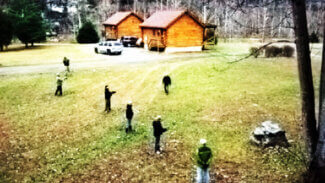 One of the Marines spotted a hand truck in the corner of the room, and without saying a word went back outside, hand truck in tow. Minutes later he was back with case after case of green beans, canned corn, and stewed tomatoes. Once they’d been weighed, his colleagues stacked the cases with military precision. Boatman looked on his crew with admiration but said nothing; this was the kind of excellence he’d come to expect from his teammates. Because he is an airline pilot one might assume that Boatman would be a bit of a control freak, but this could not be farther from the truth. Although he somehow manages to be at the center of any work that needs to be done, he’s quite content to stay behind the scenes.
One of the Marines spotted a hand truck in the corner of the room, and without saying a word went back outside, hand truck in tow. Minutes later he was back with case after case of green beans, canned corn, and stewed tomatoes. Once they’d been weighed, his colleagues stacked the cases with military precision. Boatman looked on his crew with admiration but said nothing; this was the kind of excellence he’d come to expect from his teammates. Because he is an airline pilot one might assume that Boatman would be a bit of a control freak, but this could not be farther from the truth. Although he somehow manages to be at the center of any work that needs to be done, he’s quite content to stay behind the scenes.
Boatman is a Regional Coordinator for the nonprofit Project Healing Waters Fly Fishing (PHWFF), which provides emotional and therapeutic support to veterans through fly fishing, fly tying, and various outings. Boatman serves as a go-between, helping PHWFF National Headquarters coordinate with individual programs in Virginia—among them the Quantico program headed by Program Lead Marty Laksbergs (USMC, Ret.), and the Fort Belvoir program headed by Program Lead Bob Gartner. Laksbergs and Gartner often collaborate to provide maximum impact for their participants. For the past few years I’ve had the privilege of shadowing Laksbergs’ and Gartner’s programs while doing primary research for a book on veterans and the therapeutic effects of fly fishing. I met Boatman through PHWFF, and our relationship has grown stronger with each passing year.
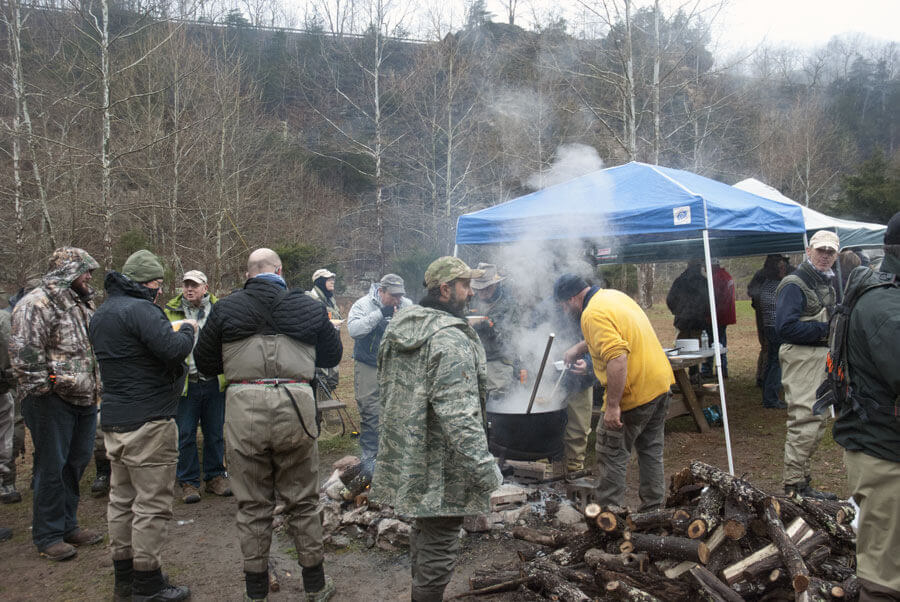 Every December for the past decade, dozens of veterans from across the country gather at Harman’s Cabins in West Virginia. The Quantico and Fort Belvoir programs are particularly well represented at the gathering; Harman’s has become a beloved weekend-long tradition during which these veterans celebrate all things fly fishing. The Harman family is well prepared for the onslaught of warriors; they’ve been hosting visitors to their property for more than 50 years. The nearly two dozen log cabins sprinkled along the edge of the North Fork of the Potomac River may appear rustic, but these outposts come complete with full kitchens, fireplaces, grills, and even hot tubs. The surrounding mountain scenery is captivating, and the nearby river is stocked generously with trout. Gartner stumbled across the property while on a fly fishing foray in West Virginia and immediately fell in love with the place. Recognizing its potential as an ideal gathering place for veterans, Gartner promptly contacted Laksbergs.
Every December for the past decade, dozens of veterans from across the country gather at Harman’s Cabins in West Virginia. The Quantico and Fort Belvoir programs are particularly well represented at the gathering; Harman’s has become a beloved weekend-long tradition during which these veterans celebrate all things fly fishing. The Harman family is well prepared for the onslaught of warriors; they’ve been hosting visitors to their property for more than 50 years. The nearly two dozen log cabins sprinkled along the edge of the North Fork of the Potomac River may appear rustic, but these outposts come complete with full kitchens, fireplaces, grills, and even hot tubs. The surrounding mountain scenery is captivating, and the nearby river is stocked generously with trout. Gartner stumbled across the property while on a fly fishing foray in West Virginia and immediately fell in love with the place. Recognizing its potential as an ideal gathering place for veterans, Gartner promptly contacted Laksbergs.
About 16 people attended the first Harman’s gatherings, and that included volunteer staff who cooked the meals; these days the annual getaway draws nearly 100 participants. The event has become so popular, in fact, that organizers now rely on a community hall and a caterer to feed everyone. Breakfast and dinner are held at the hall, and lunch is cooked over a campfire in a huge black kettle near the river. Expenses are paid for both participants and volunteers, thanks to the generosity of the Harman family and a PHWFF grant. This means that lodging, meals, and a complete fly rod-and-reel outfit for first-timers are all provided. Participants enter numerous raffles to win donated items like nets, chest packs, waders, fly lines, guidebooks, fly-tying vises, and fly-tying materials.
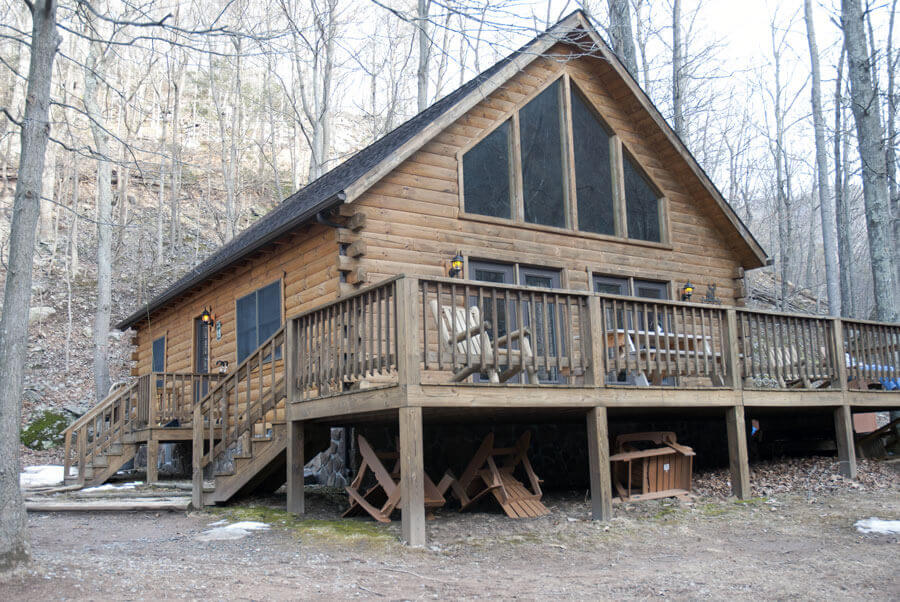 About five years into the annual gathering, Laksbergs was so moved by the generous support the group had received from West Virginia locals that he decided the visiting vets needed to give back to the local community. Eager to help those most in need, Laksbergs suggested that participants and volunteers each bring a small donation of canned goods for the local food pantry. Thus far Laksbergs’ request has resulted in donations yielding nearly six tons of food for local residents.
About five years into the annual gathering, Laksbergs was so moved by the generous support the group had received from West Virginia locals that he decided the visiting vets needed to give back to the local community. Eager to help those most in need, Laksbergs suggested that participants and volunteers each bring a small donation of canned goods for the local food pantry. Thus far Laksbergs’ request has resulted in donations yielding nearly six tons of food for local residents.
The Harman’s weekend begins on Friday afternoon when participants arrive and drop off their food donations with Laksbergs, who then assigns vets to a cabin. After check-in, participants are paired with a guide and spend the next two days fishing the river. Some guides are professionals who take this time off to volunteer for this special weekend. Some guides may be veterans, who not long ago were experiencing Harman’s for the first time themselves. After breakfast the day is spent trying to land beefy rainbows and wily brown trout, some of which barely fit into nets newly acquired the evening before. After a short lunch break, participants head back to the river until the evening meal in the dining hall, during which vets and guides share tales of fish landed and lost and swap photos of smiling anglers and their catches.
Later that evening rods are exchanged for fly-tying vises. Some participants tie flies into the wee hours of the morning; others break up into small groups to share their physical and emotional burdens with the only other people on earth who can truly understand them. The distinction between participant and guide has dissolved, perhaps washed away by the current of the river or the camaraderie born of bringing a reluctant trout to hand together. What remains are new relationships and memories of time well spent with newfound friends.
 Of course, the annual Harman’s weekend didn’t happen in December 2020. Like every other organization, Project Healing Waters had halted all in-person gatherings in the face of a global pandemic. So the long-anticipated Harman’s trip had been canceled. But for Todd Harman, joint owner of the property and longtime supporter of PHWFF, that couldn’t be the end of the story of 2020. Aware that many veterans live on fixed incomes and that others might have been out of work for months, Harman contacted Laksbergs and Gartner to offer up a number of cabins free of charge. Laksbergs and Gartner in turn reached out to their program members to gauge interest, stressing the fact that this was an unofficial invitation to a non-PHWFF affiliated weekend getaway.
Of course, the annual Harman’s weekend didn’t happen in December 2020. Like every other organization, Project Healing Waters had halted all in-person gatherings in the face of a global pandemic. So the long-anticipated Harman’s trip had been canceled. But for Todd Harman, joint owner of the property and longtime supporter of PHWFF, that couldn’t be the end of the story of 2020. Aware that many veterans live on fixed incomes and that others might have been out of work for months, Harman contacted Laksbergs and Gartner to offer up a number of cabins free of charge. Laksbergs and Gartner in turn reached out to their program members to gauge interest, stressing the fact that this was an unofficial invitation to a non-PHWFF affiliated weekend getaway.
When I received Laksbergs’ email, I jumped at the chance to attend. An extrovert by nature, I’d been floating alone on a dwindling slip of ice in a sea of isolation. Initially I had relied on frequent trips to the grocery store to keep me sane; now, with the ubiquitous masks, warning signs, and one-way aisles, picking up milk felt like venturing out into the zombie apocalypse. So Laksbergs’ email was extremely tempting, even though he made it clear that at this unofficial gathering we would not share group meals. Those attendees inclined to wearing masks, he continued, were welcome to do so, and fly tyers would be encouraged to spread out while at the vise. And although this was emphatically not a PHWFF event, Laksbergs requested that participants bring canned goods for the local food pantry as usual.
It will come as no surprise to anyone that participants rose to the occasion. Boy, did they ever: The unofficial December 2020 gathering was the smallest on record—and yet the food donations easily eclipsed all previous annual hauls. What’s more, on top of their record-breaking food contribution, participants donated more than $1,500 in cash so that Collins could purchase whatever else the food pantry might need.
Virtual meetings have their place. In fact, many of us dinosaurs, skeptical of technology at the best of times, have learned to be grateful for the digital lifeline our forefathers lacked. Some social activities—book clubs and writing groups, for example—may translate particularly well to the virtual platform. Fishing is, of course, not one of those activities. Fishing means being outdoors. Fishing leaves you feeling better whether you catch a fish or not. Simply disconnecting from the frenetic world of zinging text messages and tweets and social media posts provides a sense of calm. “Angling is an art,” said Izaak Walton, “which you enjoy when you purpose to give rest to your mind and divest yourself of your more serious business.” Fly fishing, with its rhythmic casts, constant micro-adjustments, and endless fly patterns, becomes all-consuming. It is this pleasant reprieve from the pains and stresses of life that restores a sense of inner peace. Wade in the river, and quietly soak in the calm. And the only thing better than a good day of fishing is sharing that good day with a fellow angler.
This December I hope to return to Harman’s with Laksbergs and Gartner and those program participants committed to the hard work of restoring broken bodies and wounded souls. I look forward to helping Boatman and his crew deliver thousands of pounds of food to hungry fellow humans whom they will never meet. The volunteers who make Harman’s happen do so quietly, without expectation of being recognized for their faithful service to others. But the veterans whom they serve will attest that these volunteers save lives. We are not solitary creatures who can be easily comforted by computer screens; we are relational beings who need each other—and who sometimes need to be led by the hand back from the dark places we are tempted to wander alone.
The news cycle promises hope on the horizon in the form of vaccines, restriction lifts, and grand re-openings. It is of course my fervent desire that all nonprofit organizations will be able to make a big comeback this year, a return to their mission of helping those in need. But the people who give me the most hope for the future, the people I aspire to imitate, are those who never stopped.
Beau Beasley is the Director of the Virginia and Texas Fly Fishing Festivals. His latest book on the time he’s spent with members of PHWFF on their road to recovery will be released later this year.
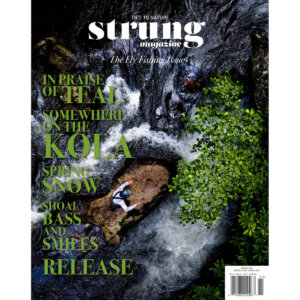 SUBSCRIBE TO TAIL FLY FISHING MAGAZINE
SUBSCRIBE TO TAIL FLY FISHING MAGAZINE
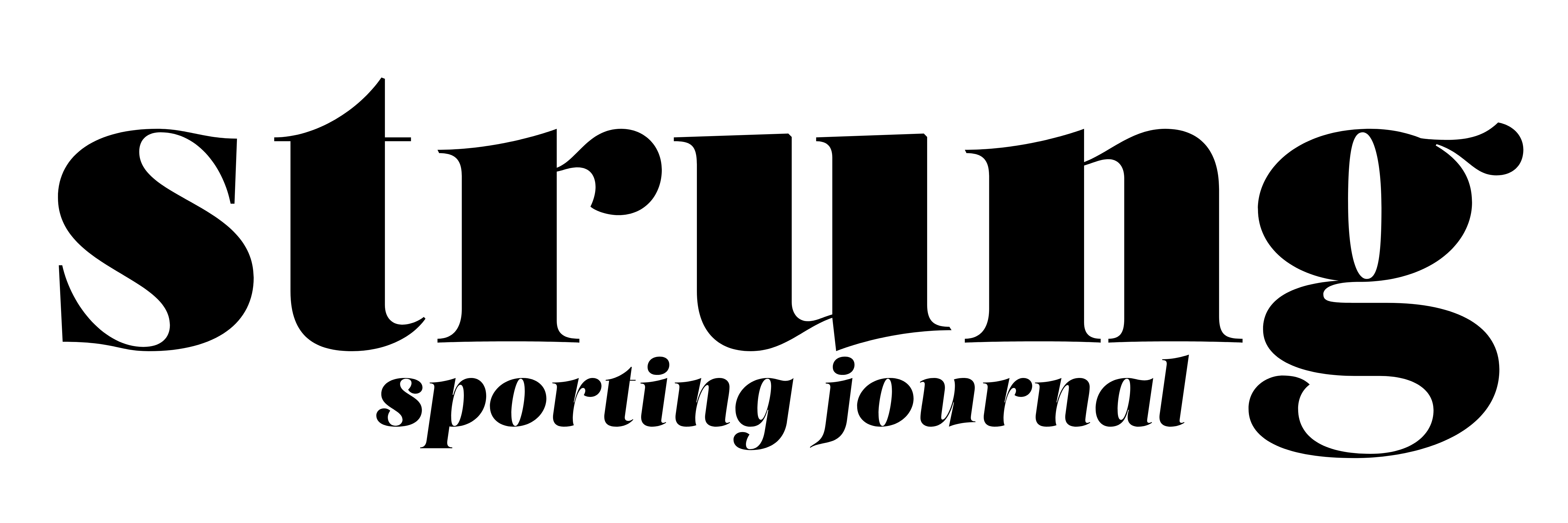


3 Comments